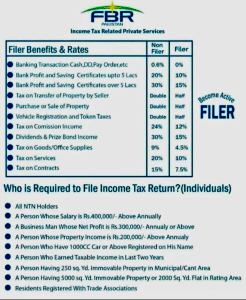Filer vs. Non-Filer in Pakistan: The Benefits of Being a Tax Filer
Discover the key differences between a filer and non-filer in Pakistan. Learn the benefits of being a tax filer, the financial penalties non-filers face, and why filing taxes is essential for your financial future.
Introduction
There is in Pakistan a line of demarcation between *filers* and *non-filers*. A *filer* is a taxpayer who files his income tax return regularly and finds his name listed in the Federal Board of Revenue’s Active Taxpayers List (ATL). The taxpayer who does not submit tax returns and is liable for higher tax rates and penalties for transactions is called a *non-filer*.
The government of Pakistan is continuously encouraging the citizens to become filers by offering low tax rates and more financial freedom for filers, whereas non-filers are penalized with increased taxes and lesser access to all financial services. The article discusses the essence of difference between filers and non-filers, why becoming a filer is essential, and ultimately why it is a requirement to be compliant with the tax laws of Pakistan.
In Pakistan, what does one call a filer?

In Pakistan, a person or company that files yearly income tax returns with the Federal Board of Revenue (FBR) is referred to as a “filer”. They receive a variety of financial and legal advantages in exchange, including being added to the Active Taxpayers List (ATL). Filers also enjoy low tax rates and have access to various incentives; therefore, it is beneficial to remain compliant with regard to taxes.
How to Become a Filer in Pakistan
1. NTN registration:
Obtain a National Tax Number for which one has to get registered with FBR through CNIC for individuals and other different documents for companies.
2. Submit Income Tax Returns:
Submit an annual income tax return to the FBR via its portal, IRIS, which subsequently declares your earnings, expenditure, and assets.
3. Verify ATL Status:
Ensure that your name is in the Active Taxpayers List (ATL) weekly updated. Only those who are in the ATL list are considered as a filer.
What is a Non-Filer in Pakistan?
A *non-filer* is a person or a business that is not lodging their income tax returns with the FBR. Non- filers do not come under the ATL, and for this reason, they pay increased withholding taxes and penalties on property purchase, vehicle registration, and other banking transactions.
Although withholding taxes are collected from non-filers, they miss tremendous advantages and are placed at a financial disadvantage compared to the filers.
Key Differences Between Filers and Non-Filers

|
Category |
Filer | Non-Filer |
| Income Tax | Files tax returns regularly | Does not file tax returns |
| Tax rates | Lower taxes on buying/selling | Higher taxes and restrictions |
| Vehicle Registration | Lesser fees | Higher fees and penalties |
| Bank Transactions | Lower tax on cash withdrawals | Higher tax on banking activity |
|
Loan Access |
Easier access to loans and credit |
Difficult access to fianancial products |
| Government Benefits | Eligible for subsidies and schemes | Ineligible for many programs |
Benefits of Being a Filer in Pakistan

1 Lower Withholding Taxes
A filer makes numerous financial transactions with lower withholding tax rates compared to non-filers. Whether property dealings, car registration, or withdrawal from a bank, this is done more favorably for the filer than for the non-filers. Thus, when a filer purchases a property, it is taxed at 1%, but a non-filer may be charged up to 2% taxes.
2. Incentive of the Government
Most government programs, including loans for low-cost housing or small business financing, are limited to filers. Non-filers are not eligible for most of these.
3. Simplified Transactions of Funds
Filers will have less restrictions in buying of properties, car registration, and other expensive transactions. Non-filers are restricted on the amount of property they can buy and have higher charges with regards to these transactions.
4. Compliance to Law
As a filer, you are always compliant with tax laws of Pakistan. Non-compliance in terms of the tax laws can lead to penalties, FBR investigations, and more scrutiny on your financial dealings.
5. Enhancement in Loans
Banks and financial institutes give loan approvals and good credit terms to filers. Being financially sound, filers get loans for personal or business purposes easily.
Disadvantages of Non-Filing in Pakistan
1. More Tax
They are heavily taxed on all the transactions- Property Purchase, Car registration, and Bank transactions. The tax is charged as high as 0.6% on cash withdrawal more than PKR 50,000 from a bank for non-filers where as for filers it will only be at 0.3%.
2. Less Credit Facilities
Non-filers do not get government incentives, low interest loans, etc. Also, they are not favored at the time of taking bank and finance houses’ loans.
3. Higher Vigilance of FBR
The FBR is aware of all non-filers. Any large purchase, whether property or cars, sends a tax notice from the tax authorities and eventually results in penalties and even landing into trouble with law and order enforcement agencies.
4. Financial Constraints
Conclusively, the non-filer cannot purchase real estate with a value over a certain amount, and in most cases, may not be eligible for other forms of investments. This majorly hinders their chance to maximize their wealth as well as acquiring more assets.
5. Punishment through Laws
In the long run, the non-filer may risk being penalized or their assets might even be put under freeze if they do not adhere to the tax laws provided by the FBR.
How to Change from Non-Filer to Filer

if you are a non-filer and you want to enjoy low tax rates, good economic opportunities, then that is quite straightforward.
- Enroll with FBR: Get your NTN by registering through the FBR’s IRIS portal.
- File Tax Return: You will then file a tax return, declaring all your incomes and expenses and asset/capital gains, if you have any, for the previous year.
- Confirm Your Name on the ATL Verify that your name is in the ATL while your return is being processed. Your presence in the ATL is confirmed to be an official status by an IRS as a tax filer.
Why be a Filer in Pakistan
The government is now making it increasingly unfeasible to remain a non-filer in Pakistan by inflicting more punitive taxes and curtailing financial freedoms. While attaining the status of a filer is, foremost, a legal obligation, it also brings great financial benefits, such as paying lower tax rates, minimal restrictions on property transactions, and facilitation in credit access.
More importantly, having been a filer ensures that you are contributing to the national development in Pakistan. Of course, taxes basically account for a bulk of revenue generated by the government. The funding covers projects on infrastructure, health, education, and many others.
Conclusion:
In Pakistan, a filer and non-filer literally make a very good difference in the financial manner. The people who are filers get some elements of low taxation, direct benefits from the governments, and smooth financial transactions where as non-filers have more taxes and penalties with high surveillance of FBR. So, now is the time to become a filer, if not yet. You file taxes not only for securing your future finances but also for contributing your fair share to the country’s economy.
Sign up with the FBR and file your tax returns today-it is a small step toward much greater long-term rewards.

